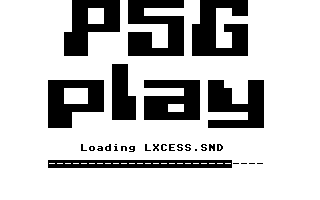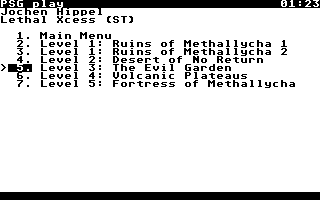PSG play is a music player and emulator for the Atari ST Programmable Sound Generator (PSG) YM2149 and files in the SNDH archive.
This repository has Git submodules
so clone it with the --recurse-submodules option, or do
git submodule update --init --recursive.
For Linux and Mac OS, do make psgplay to compile psgplay. To use
Advanced Linux Sound Architecture
(ALSA) and interactive text mode, do make ALSA=1 psgplay.
For Atari ST, do make TARGET_COMPILE=m68k-elf- PSGPLAY.TOS.
For Javascript,
Webassembly, and the
Emscripten compiler, do
make HOST_CC=emcc web. The PSG play library is available with
Cowbell, having a particular
focus on demoscene music.
The BUILD_CC, HOST_AR, HOST_CC, and TARGET_CC with TARGET_LD
Makefile
variables can be configured for various compilation settings.
The BUILD_CFLAGS, HOST_CFLAGS, TARGET_CFLAGS, and TARGET_LDFLAGS
variables are available as well.
Review the file
INSTALL
for installation instructions.
The package
media-sound/psgplay
is available for Gentoo Linux.
Github actions
automatically compile and publish archives with PSG play for
the Atari ST,
as well as Linux and the architectures
ppc64le,
aarch64 and
x86-64. These are built with
.github/workflows/compilation.yml.
PSG play options for Linux and Mac OS:
Usage: psgplay [options]... <sndh-file>
General options:
-h, --help display this help and exit
--version display version and exit
-v, --verbose increase verbosity
-i, --info display SNDH file info and exit
Play options:
-o, --output=<file> write audio output to the given file in WAVE format
or to an ALSA handle if prefixed with "alsa:"
--start=<[mm:]ss.ss> start playing at the given time
--stop=<[mm:]ss.ss|auto|never>
stop playing at the given time, or automatically
if the track has a known duration, or never
--length=<[mm:]ss.ss> play for the given duration
-m, --mode=<command|text>
command or interactive text mode
-t, --track=<num> set track number
-f, --frequency=<num> set audio frequency in Hz (default 44100)
--psg-mix=<empiric|linear>
empiric (default) mixes the three PSG channels as
measured on Atari ST hardware; linear sums the
channels to produce a cleaner sound
Disassembly options:
--disassemble disassemble SNDH file and exit; may be combined
with the --trace=cpu option for self-modifying code,
disassembly of interrupt code, etc.
--disassemble-header disassemble SNDH file header and exit
--disassemble-address display address column in disassembly
--remake-header remake SNDH file header in disassembly
Tracing options:
--trace=<device>,... trace device operations of SNDH file and exit:
all cpu reg
PSG play defaults to interactive text mode if it is compiled with ALSA for Linux, or is compiled for Atari ST. Mac OS does not support interactive text mode, only command mode with WAVE format output, as described in issue #8.
For Linux, TTY mode and ECMA-48 are used, including support for job control such as process suspension.
For Atari ST, text mode and VT52 are used. See issues #5 and #6 for ideas about additional serial port and GEM user interfaces.
The currently playing tune is indicated in
reverse video.
A cursor is shown with >. Keyboard controls:
escapeorqto quit;sto stop;porspacebarto pause;1,2, ...,9to play tunes 1, 2, ..., 9;-to decrease volume;+to increase volume;<to play the previous tune;>to play the next tune;korup arrowto move the cursor up;jordown arrowto move the cursor down;returnto play the tune at the cursor.
PSG play runs in command mode if it is not compiled with ALSA for Linux,
or is compiled for Mac OS, or the options -o, --output, --start,
--stop, --length, --disassemble or --trace are given. Atari ST
does not support command mode.
PSG play is compiled into the static library
lib/psgplay/psgplay.a and the shared library lib/psgplay/psgplay.so. The
application programming interface
(API) is documented in
include/psgplay/psgplay.h,
include/psgplay/stereo.h,
include/psgplay/sndh.h and
include/psgplay/version.h.
The library also supplies an unaltered 250 kHz digital form for custom
analogue filters and mixers. This digital interface is documented in
include/psgplay/digital.h.
There are two simple examples on how to use the PSG play library:
lib/example/example-info.cis an example on how to display SNDH tags;lib/example/example-play.cis an example on how to play an SNDH file in 44.1 kHz stereo.
PSG play can disassemble SNDH files. This can be used to debug, update
metadata and reassemble SNDH files. The --disassemble option can be used
for code inspection. The --disassemble-header option is the safest
choice when updating SNDH metadata, because most of the code is retained
with dc.b data bytes for exact reassembly.
The disassembly is guided by instruction reachability from the init,
play, and exit entry points, to separate executable instructions from
data. To deal with interrupt code and
self-modifying code,
use both the --disassemble and the --trace=cpu options. The disassembly
will then print what the processor actually executed in memory, which may
have been modified by the program itself, rather than the contents of the
SNDH file. The tracing execution length can be set with the --length
option.
The --remake-header option can be used to repair broken SNDH metadata such
as missing tags, excessive whitespace, etc. It can also be used to update or
add new metadata, by editing the produced assembly source code in an editor.
Excerpt of disassembly with the --disassemble option:
init:
bra.w _init ; init
exit:
bra.w _exit ; exit
play:
bra.w _play ; play
sndh:
dc.b $53,$4e,$44,$48,$43,$4f,$4d,$4d ; SNDHCOMM
dc.b $4d,$61,$64,$20,$4d,$61,$78,$00 ; Mad Max.
dc.b $52,$49,$50,$50,$47,$72,$61,$7a ; RIPPGraz
dc.b $65,$79,$20,$2f,$20,$50,$48,$46 ; ey / PHF
dc.b $00,$43,$4f,$4e,$56,$47,$72,$61 ; .CONVGra
dc.b $7a,$65,$79,$20,$2f,$20,$50,$48 ; zey / PH
dc.b $46,$00,$54,$49,$54,$4c,$57,$61 ; F.TITLWa
dc.b $72,$70,$00,$23,$23,$30,$38,$00 ; rp.##08.
dc.b $54,$43,$35,$30,$00,$00 ; TC50..
_init:
lea _9a(pc),a0 ; init
lea _9e(pc),a1 ; init
move.l a0,(a1) ; init
subi.w #1,d0 ; init
lea _b4a(pc),a0 ; init
lea _ac(pc),a1 ; init
move.l d0,d1 ; init
asl.w #3,d1 ; init
movea.l (a1,d1.w),a2 ; init
addq.w #6,d1 ; init
move.w (a1,d1.w),d0 ; init
lea _b4a(pc),a0 ; init
adda.l a2,a0 ; init
lea _ec(pc),a1 ; init
move.l a0,56(a1) ; init
move.l a0,108(a1) ; init
clr.w 2104(a1) ; init
bsr.w _ec ; init
lea _f4(pc),a0 ; init
lea _9e(pc),a1 ; init
move.l a0,(a1) ; init
_9a:
rts ; init
_exit:
rts ; exit
_9e:
dc.b $00,$00,$00,$00
_play:
movea.l _9e(pc),a0 ; play
jsr (a0) ; play
rts ; play
...
Excerpt of disassembly with the --disassemble-header option:
init:
bra.w _init
exit:
bra.w _exit
play:
bra.w _play
sndh:
dc.b $53,$4e,$44,$48,$43,$4f,$4d,$4d ; SNDHCOMM
dc.b $4d,$61,$64,$20,$4d,$61,$78,$00 ; Mad Max.
dc.b $52,$49,$50,$50,$47,$72,$61,$7a ; RIPPGraz
dc.b $65,$79,$20,$2f,$20,$50,$48,$46 ; ey / PHF
dc.b $00,$43,$4f,$4e,$56,$47,$72,$61 ; .CONVGra
dc.b $7a,$65,$79,$20,$2f,$20,$50,$48 ; zey / PH
dc.b $46,$00,$54,$49,$54,$4c,$57,$61 ; F.TITLWa
dc.b $72,$70,$00,$23,$23,$30,$38,$00 ; rp.##08.
dc.b $54,$43,$35,$30,$00,$00 ; TC50..
_init:
dc.b $41,$fa,$00,$46,$43,$fa,$00,$46
dc.b $22,$88,$04,$40,$00,$01,$41,$fa
dc.b $0a,$e8,$43,$fa,$00,$46,$22,$00
dc.b $e7,$41,$24,$71,$10,$00,$5c,$41
dc.b $30,$31,$10,$00,$41,$fa,$0a,$d2
dc.b $d1,$ca,$43,$fa,$00,$6e,$23,$48
dc.b $00,$38,$23,$48,$00,$6c,$42,$69
dc.b $08,$38,$61,$00,$00,$5e,$41,$fa
dc.b $00,$62,$43,$fa,$00,$08,$22,$88
dc.b $4e,$75
_exit:
dc.b $4e,$75,$00,$00,$00,$00
_play:
dc.b $20,$7a,$ff,$fa,$4e,$90,$4e,$75
...
Excerpt of disassembly with the --disassemble-header and
--remake-header options (having the missing HDNS tag automatically
repaired from the previous excerpt):
init:
bra.w _init
exit:
bra.w _exit
play:
bra.w _play
sndh:
dc.b 'SNDH'
dc.b 'COMMMad Max',0
dc.b 'RIPPGrazey / PHF',0
dc.b 'CONVGrazey / PHF',0
dc.b 'TITLWarp',0
dc.b '##08',0
dc.b 'TC50',0
even
dc.b 'HDNS'
_init:
dc.b $41,$fa,$00,$46,$43,$fa,$00,$46
dc.b $22,$88,$04,$40,$00,$01,$41,$fa
dc.b $0a,$e8,$43,$fa,$00,$46,$22,$00
dc.b $e7,$41,$24,$71,$10,$00,$5c,$41
dc.b $30,$31,$10,$00,$41,$fa,$0a,$d2
dc.b $d1,$ca,$43,$fa,$00,$6e,$23,$48
dc.b $00,$38,$23,$48,$00,$6c,$42,$69
dc.b $08,$38,$61,$00,$00,$5e,$41,$fa
dc.b $00,$62,$43,$fa,$00,$08,$22,$88
dc.b $4e,$75
_exit:
dc.b $4e,$75,$00,$00,$00,$00
_play:
dc.b $20,$7a,$ff,$fa,$4e,$90,$4e,$75
...
Disassembly makes it possible to supply bug fixes and metadata updates in source patch form, for quick and easy review, application and SNDH file reassembly:
--- sndh/Mad_Max/Games/Lethal_Xcess_(ST).S.orig 2020-05-22 14:56:20.495508523 +0200
+++ sndh/Mad_Max/Games/Lethal_Xcess_(ST).S.new 2020-05-22 15:23:55.260509689 +0200
@@ -6,13 +6,31 @@
bra.w _play
sndh:
dc.b 'SNDH'
- dc.b 'TITLLethal Xcess (ST/Falc)',0
- dc.b 'COMMMad Max',0
+ dc.b 'TITLLethal Xcess (ST)',0
+ dc.b 'COMMJochen Hippel',0
dc.b 'RIPPGrazey / PHF',0
dc.b 'CONVGrazey / PHF',0
+ dc.b 'YEAR1991',0
dc.b 'TC50',0
dc.b '##07',0
even
+.subtitles:
+ dc.b '!#SN'
+ dc.w .st1-.subtitles
+ dc.w .st2-.subtitles
+ dc.w .st3-.subtitles
+ dc.w .st4-.subtitles
+ dc.w .st5-.subtitles
+ dc.w .st6-.subtitles
+ dc.w .st7-.subtitles
+.st1: dc.b 'Main Menu',0
+.st2: dc.b 'Level 1: Ruins of Methallycha 1',0
+.st3: dc.b 'Level 1: Ruins of Methallycha 2',0
+.st4: dc.b 'Level 2: Desert of No Return',0
+.st5: dc.b 'Level 3: The Evil Garden',0
+.st6: dc.b 'Level 4: Volcanic Plateaus',0
+.st7: dc.b 'Level 5: Fortress of Methallycha',0
+ even
dc.b 'HDNS'
_init:
dc.b $2f,$00,$41,$fa,$00,$6e,$4a,$50
The SNDH file format is an Atari ST machine code executable form of music. A substantial part of Atari ST hardware must be emulated to play such files using other kinds of computers. The five most complex parts emulated in software by PSG play are:
-
the Motorola 68000 processor, via the Musashi library in
lib/m68k; -
the Programmable Sound Generator (PSG) YM2149 in
lib/atari/psg.c; -
the DMA sound of the Atari STE in
lib/atari/sound.c; -
the LMC1992 mixer of the Atari STE in
lib/atari/mixer.c; -
the MC68901 multifunction peripheral (MFP) timer and interrupt controller in
lib/atari/mfp.c.
The digital emulation is currently fairly accurate, aiming to be within the variation of the compatible models of original Atari hardware. The analogue emulation is currently simpler, aiming to be accurate but also avoid unwanted artifacts such as the high level of noise produced with original Atari hardware.
The YM2149 PSG signal is unipolar, and has to be transformed to a bipolar signal for mixing with stereo samples. To avoid sharp and audible noise when starting and stopping playback, stereo samples fade in and out with a 10 ms logistic sigmoid at start and stop.
As described in issues #9 and #10, DMA sound and LMC1992 for tone control specific to Atari STE and related hardware are not yet fully emulated by PSG play.

